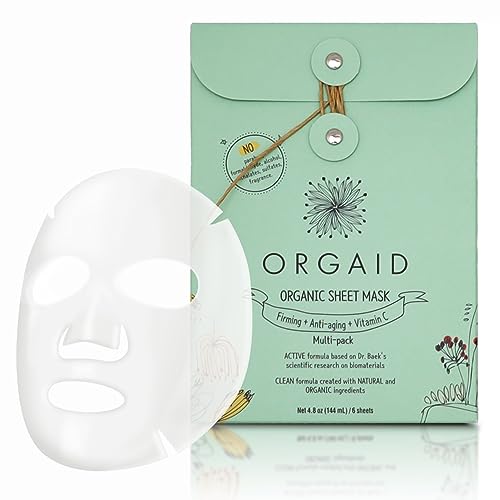
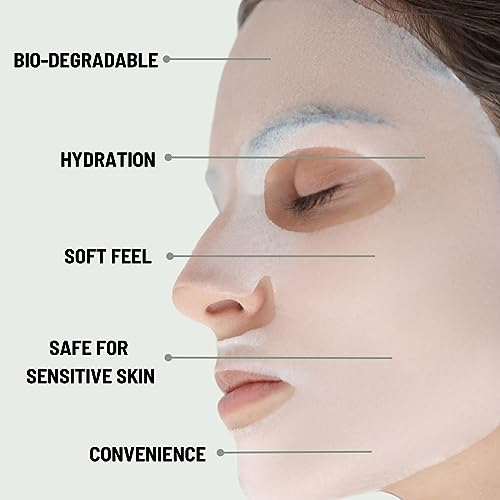
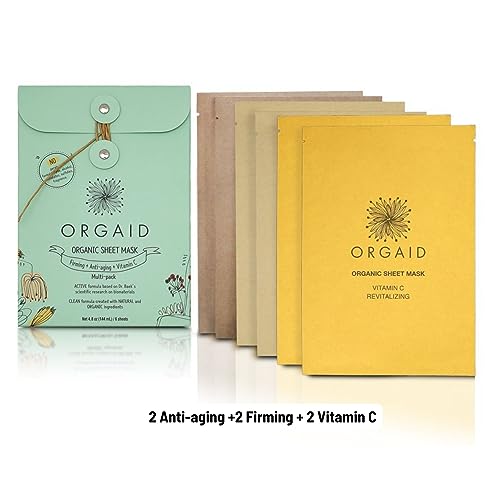
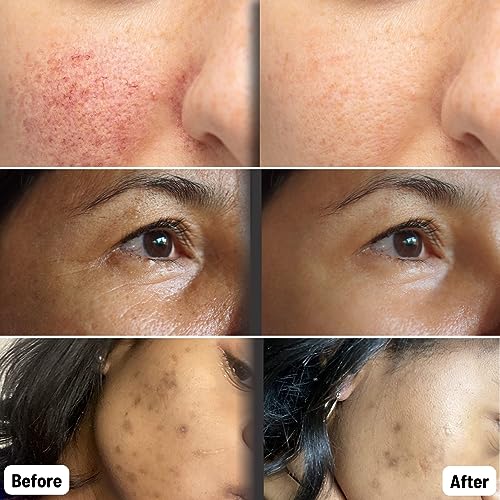
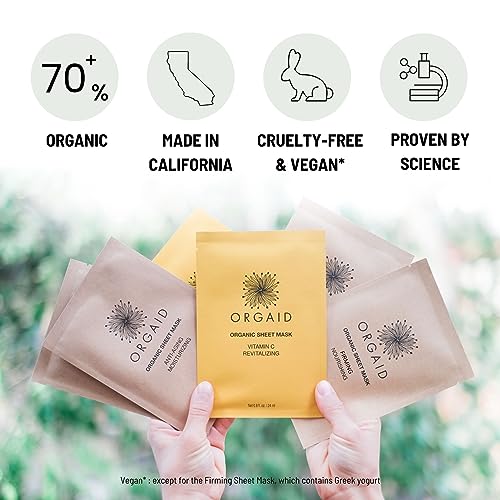


ORGAID Organic Sheet Mask - Hydrating, Soothing, Cruelty-Free - 6 Assorted Masks for All Skin Types


Ascorbic Acid (Vitamin C)
Low RiskAscorbic acid (Vitamin C) is a naturally occurring antioxidant essential for various biological functions, including collagen synthesis and immune response. It is commonly used in cosmetic and food products for its preservative properties and ability to enhance skin brightness.
Sustai Insights
Ascorbic acid provides functional benefits as an effective antioxidant and preservative, contributing to skin health and product stability. It is generally recognized as safe with low health risks, including minimal concerns for carcinogenicity and allergies. Environmentally, it poses low risks, as it is biodegradable and does not bioaccumulate. Regulatory bodies like the FDA have not imposed significant restrictions on its use. Overall, the ingredient presents a low risk, with safe usage practices ensuring consumer safety, and alternatives such as natural extracts exist for those seeking different formulations.
Xanthan Gum
Low RiskXanthan gum is a polysaccharide, a sugar-based compound produced by the fermentation of glucose or sucrose. It is commonly used as a thickening agent and stabilizer in various food and cosmetic products due to its ability to improve texture and prevent ingredient separation.
Sustai Insights
Xanthan gum serves effectively as a thickener and stabilizer, enhancing product texture and consistency. It is biodegradable and typically derived from renewable sources, supporting sustainability efforts. Health risks are minimal, with low concerns regarding carcinogenicity, allergies, and reproductive toxicity. Environmental impact is similarly low, posing no significant hazards. Regulatory agencies, including the FDA, regard it as safe for use, with no significant restrictions. Overall, xanthan gum is assessed as low risk, making it a suitable ingredient in formulations.
Niacinamide
Low RiskNiacinamide, also known as nicotinamide, is a form of vitamin B3 (niacin) that serves various functions in skincare and cosmetic products. It is often used for its potential benefits in improving skin texture, enhancing moisture retention, and supporting the skin's barrier function.
Sustai Insights
Niacinamide provides functional benefits such as enhancing skin hydration and improving the appearance of uneven skin tone. It is generally recognized as safe, with low concerns regarding carcinogenicity, allergies, or reproductive toxicity. However, enhanced skin absorption may pose risks for sensitive individuals. Regulatory bodies impose few restrictions on its use, and it is considered low risk overall. For safer alternatives, options like panthenol may be considered. Overall, niacinamide is a low-risk ingredient when used appropriately.
Sucrose Palmitate
Low RiskSucrose palmitate is a monoester of palmitic acid and sucrose, commonly used as an emulsifier and stabilizer in various cosmetic and food products. It helps to blend oil and water-based ingredients, enhancing texture and consistency.
Sustai Insights
Sucrose palmitate offers functional benefits as an effective emulsifier, facilitating the uniform distribution of ingredients in formulations. It is considered biodegradable and sustainably sourced. Health risks are minimal, with low concerns for carcinogenicity, allergies, and reproductive toxicity. Environmental risks are also low, with no significant pollutant or bioaccumulation concerns. Regulatory bodies do not impose restrictions on its use, indicating a low-risk profile overall. For safety, it is recommended to use within established concentrations, and alternatives like other plant-derived emulsifiers may be considered for those seeking greener options.
Allantoin
Low RiskAllantoin is a naturally occurring nitrogenous compound found in various plants and animals. It is commonly used in cosmetic formulations for its soothing and moisturizing properties, as well as its ability to promote skin cell turnover and healing.
Sustai Insights
Allantoin offers functional benefits such as skin soothing, hydration, and promoting cell regeneration. It is generally recognized as safe, with low concerns regarding carcinogenicity, allergies, and reproductive toxicity. Environmentally, it poses minimal risks, being biodegradable and sustainably sourced. Regulatory bodies do not impose significant restrictions on its use. Overall, the risk level associated with allantoin is low, making it a favorable ingredient in personal care products.
Water
Low RiskWater is a clear, colorless liquid essential for various biological processes. It serves as a solvent in formulations, facilitating the dissolution of other ingredients and enhancing product texture and application. Additionally, water plays a crucial role in hydration and is a key component in many cosmetic and personal care products.
Sustai Insights
Water is an effective solvent and hydrator, contributing to the texture and efficacy of formulations. It is biodegradable and generally regarded as safe, with low concerns regarding carcinogenicity, allergies, and reproductive toxicity. However, excessive water usage can lead to environmental concerns, particularly regarding resource depletion. Regulatory bodies do not impose restrictions on water use in cosmetics. Overall, the risks associated with water are low, making it a safe and essential ingredient.
Maltodextrin
Low RiskMaltodextrin is a saccharide material obtained from starch through partial hydrolysis. It is commonly used as a thickener, filler, or preservative in food and cosmetic products due to its ability to enhance texture and stability.
Sustai Insights
Maltodextrin serves as an effective thickener and stabilizer in various products, and it is typically derived from renewable sources. Health risks are minimal, as it poses low concerns for carcinogenicity, allergies, and developmental toxicity. Environmental impacts are also low, with no significant pollutant or bioaccumulation potential. Regulatory bodies do not impose major restrictions on its use. Overall, maltodextrin presents a low-risk profile, making it a widely accepted ingredient in food and cosmetic formulations.
Beta Glucan
Low RiskBeta-glucan is a polysaccharide consisting of glucose monomers. It is commonly derived from yeast, oats, or certain fungi and is recognized for its role in skincare as a humectant and soothing agent.
Sustai Insights
Beta-glucan offers functional benefits such as skin hydration and soothing properties, suggesting potential uses in cosmetics and skincare. It is generally recognized as safe, with low concerns regarding carcinogenicity, allergies, and reproductive toxicity. Environmental risks appear minimal, with no significant pollutant or bioaccumulation potential. Regulatory bodies impose few restrictions, reflecting its low-risk profile. Safe usage practices should be followed, and while alternatives exist, beta-glucan remains a low-risk ingredient overall.
Salix Alba (White Willow)
Low RiskSalix alba, commonly known as white willow, is a tree whose bark is traditionally used for its salicylate content, which is chemically related to aspirin. It is primarily utilized in herbal remedies and cosmetic formulations for its anti-inflammatory and analgesic properties.
Sustai Insights
White willow is valued for its functional benefits, particularly its anti-inflammatory and pain-relieving effects, making it useful in topical applications. It is considered low risk for health concerns, including cancer, allergies, and reproductive toxicity. Environmentally, it poses minimal hazards, with no bioaccumulation noted. Regulatory bodies do not impose restrictions on its use. Safe practices involve using it as directed, and alternatives like willow bark extract can be considered for similar benefits. Overall, white willow presents a low risk profile.
Arginine
Low RiskArginine is a naturally occurring amino acid that plays a critical role in various biological processes, including protein synthesis and the production of nitric oxide, which is important for vasodilation. It is commonly used in dietary supplements and functional foods.
Sustai Insights
Arginine offers functional benefits such as promoting blood flow and supporting muscle metabolism. It is not associated with significant health risks, as concerns regarding carcinogenicity, allergies, and reproductive toxicity are low. Environmentally, it presents minimal risks, being biodegradable and not classified as a pollutant. Regulatory bodies have not imposed specific restrictions on arginine. Overall, the risk level is low, indicating that arginine can be safely used in products, though safe usage practices should be followed.
Hyaluronic Acid
Low RiskHyaluronic acid is a natural polysaccharide found in connective tissues, skin, and cartilage, primarily serving as a moisture-retaining agent in cosmetic products. Its primary function is to provide hydration and improve skin elasticity, making it a common ingredient in moisturizers and serums.
Sustai Insights
Hyaluronic acid offers significant functional benefits, such as effective hydration and skin plumping, while being biodegradable and generally recognized as safe by regulatory bodies. Health risks are minimal, with low concerns regarding carcinogenicity, allergies, or reproductive toxicity. Environmental risks are also low, as it is not considered a pollutant or bioaccumulative. Regulatory bodies have not issued major advisories against its use, resulting in an overall low-risk assessment. For safe usage, it is recommended to apply in appropriate concentrations. Alternatives include glycerin or aloe vera, which also provide hydration.
Lactobacillus Ferment
Low RiskLactobacillus ferment is an extract of the probiotic bacterium Lactobacillus, commonly used in cosmetic and personal care products for its potential skin health benefits. It is known for its role in fermentation processes, contributing to the formulation's efficacy as a skin conditioning agent.
Sustai Insights
Lactobacillus ferment offers functional benefits by improving skin hydration and barrier function, and it is often derived from sustainable sources. Health risks are low, with minimal concerns regarding carcinogenicity, allergies, or reproductive toxicity. Environmentally, it poses low risks, with no significant pollutant or bioaccumulation potential. Regulatory agencies do not impose restrictions on its use. Overall, the ingredient is assessed as low risk, and safe usage practices should be followed. Alternatives such as other probiotic extracts may be considered for similar benefits.
Punica Granatum (Pomegranate)
Low RiskPunica granatum, commonly known as pomegranate, is a fruit-derived ingredient used in various cosmetic and personal care products. It is primarily recognized for its antioxidant properties and is often included for its potential benefits in skin health and hydration.
Sustai Insights
Pomegranate is valued for its antioxidant benefits, which may help protect skin from oxidative stress. It is generally considered low risk regarding health concerns, with minimal evidence linking it to carcinogenicity, allergies, or reproductive toxicity. Environmentally, it poses low risks as it is not classified as a pollutant or bioaccumulative. Regulatory assessments indicate no current restrictions. Safe usage practices should be followed, with potential alternatives including other fruit extracts for similar benefits. Overall, the ingredient presents a low risk profile.
Lonicera Caprifolium (Honeysuckle) Flower Extract
Low RiskLonicera caprifolium (honeysuckle) flower extract is derived from the flowers of the honeysuckle plant. It is commonly used in cosmetic formulations for its potential soothing and fragrance properties, as well as its role as a natural extract in various personal care products.
Sustai Insights
Honeysuckle flower extract offers functional benefits, including soothing properties and potential antioxidant effects. It is generally regarded as low risk for health concerns, including carcinogenicity, allergenic potential, and developmental toxicity. Environmentally, it presents low risks for pollution and bioaccumulation. Regulatory assessments do not list significant warnings or restrictions. Overall, it is considered low risk, with safe usage practices advisable, and alternatives include other natural extracts with similar properties.
Hamamelis Virginiana (Witch Hazel) Distillate
Low RiskHamamelis virginiana (witch hazel) distillate is a plant-derived extract commonly used in cosmetic formulations for its astringent and soothing properties. It is primarily utilized for its ability to reduce inflammation and tighten skin, making it a popular ingredient in toners and aftershaves.
Sustai Insights
Witch hazel distillate exhibits several functional benefits, including its anti-inflammatory and astringent properties, which are beneficial for skin care. It is considered to have low health risks regarding carcinogenicity, allergies, and reproductive toxicity, with enhanced skin absorption being noted. Environmental concerns are minimal, as it is not classified as a pollutant or bioaccumulative. Regulatory bodies do not impose significant restrictions on its use. Overall, it is assessed as low risk, with recommendations for safe application in cosmetic products and consideration of alternatives like chamomile extract for similar benefits.
Ascorbic Acid (Vitamin C)
Low RiskAscorbic acid (Vitamin C) is a naturally occurring antioxidant essential for various biological functions, including collagen synthesis and immune response. It is commonly used in cosmetic and food products for its preservative properties and ability to enhance skin brightness.
Sustai Insights
Ascorbic acid provides functional benefits as an effective antioxidant and preservative, contributing to skin health and product stability. It is generally recognized as safe with low health risks, including minimal concerns for carcinogenicity and allergies. Environmentally, it poses low risks, as it is biodegradable and does not bioaccumulate. Regulatory bodies like the FDA have not imposed significant restrictions on its use. Overall, the ingredient presents a low risk, with safe usage practices ensuring consumer safety, and alternatives such as natural extracts exist for those seeking different formulations.
Xanthan Gum
Low RiskXanthan gum is a polysaccharide, a sugar-based compound produced by the fermentation of glucose or sucrose. It is commonly used as a thickening agent and stabilizer in various food and cosmetic products due to its ability to improve texture and prevent ingredient separation.
Sustai Insights
Xanthan gum serves effectively as a thickener and stabilizer, enhancing product texture and consistency. It is biodegradable and typically derived from renewable sources, supporting sustainability efforts. Health risks are minimal, with low concerns regarding carcinogenicity, allergies, and reproductive toxicity. Environmental impact is similarly low, posing no significant hazards. Regulatory agencies, including the FDA, regard it as safe for use, with no significant restrictions. Overall, xanthan gum is assessed as low risk, making it a suitable ingredient in formulations.
Niacinamide
Low RiskNiacinamide, also known as nicotinamide, is a form of vitamin B3 (niacin) that serves various functions in skincare and cosmetic products. It is often used for its potential benefits in improving skin texture, enhancing moisture retention, and supporting the skin's barrier function.
Sustai Insights
Niacinamide provides functional benefits such as enhancing skin hydration and improving the appearance of uneven skin tone. It is generally recognized as safe, with low concerns regarding carcinogenicity, allergies, or reproductive toxicity. However, enhanced skin absorption may pose risks for sensitive individuals. Regulatory bodies impose few restrictions on its use, and it is considered low risk overall. For safer alternatives, options like panthenol may be considered. Overall, niacinamide is a low-risk ingredient when used appropriately.
Sucrose Palmitate
Low RiskSucrose palmitate is a monoester of palmitic acid and sucrose, commonly used as an emulsifier and stabilizer in various cosmetic and food products. It helps to blend oil and water-based ingredients, enhancing texture and consistency.
Sustai Insights
Sucrose palmitate offers functional benefits as an effective emulsifier, facilitating the uniform distribution of ingredients in formulations. It is considered biodegradable and sustainably sourced. Health risks are minimal, with low concerns for carcinogenicity, allergies, and reproductive toxicity. Environmental risks are also low, with no significant pollutant or bioaccumulation concerns. Regulatory bodies do not impose restrictions on its use, indicating a low-risk profile overall. For safety, it is recommended to use within established concentrations, and alternatives like other plant-derived emulsifiers may be considered for those seeking greener options.
Allantoin
Low RiskAllantoin is a naturally occurring nitrogenous compound found in various plants and animals. It is commonly used in cosmetic formulations for its soothing and moisturizing properties, as well as its ability to promote skin cell turnover and healing.
Sustai Insights
Allantoin offers functional benefits such as skin soothing, hydration, and promoting cell regeneration. It is generally recognized as safe, with low concerns regarding carcinogenicity, allergies, and reproductive toxicity. Environmentally, it poses minimal risks, being biodegradable and sustainably sourced. Regulatory bodies do not impose significant restrictions on its use. Overall, the risk level associated with allantoin is low, making it a favorable ingredient in personal care products.
Water
Low RiskWater is a clear, colorless liquid essential for various biological processes. It serves as a solvent in formulations, facilitating the dissolution of other ingredients and enhancing product texture and application. Additionally, water plays a crucial role in hydration and is a key component in many cosmetic and personal care products.
Sustai Insights
Water is an effective solvent and hydrator, contributing to the texture and efficacy of formulations. It is biodegradable and generally regarded as safe, with low concerns regarding carcinogenicity, allergies, and reproductive toxicity. However, excessive water usage can lead to environmental concerns, particularly regarding resource depletion. Regulatory bodies do not impose restrictions on water use in cosmetics. Overall, the risks associated with water are low, making it a safe and essential ingredient.
Maltodextrin
Low RiskMaltodextrin is a saccharide material obtained from starch through partial hydrolysis. It is commonly used as a thickener, filler, or preservative in food and cosmetic products due to its ability to enhance texture and stability.
Sustai Insights
Maltodextrin serves as an effective thickener and stabilizer in various products, and it is typically derived from renewable sources. Health risks are minimal, as it poses low concerns for carcinogenicity, allergies, and developmental toxicity. Environmental impacts are also low, with no significant pollutant or bioaccumulation potential. Regulatory bodies do not impose major restrictions on its use. Overall, maltodextrin presents a low-risk profile, making it a widely accepted ingredient in food and cosmetic formulations.
Beta Glucan
Low RiskBeta-glucan is a polysaccharide consisting of glucose monomers. It is commonly derived from yeast, oats, or certain fungi and is recognized for its role in skincare as a humectant and soothing agent.
Sustai Insights
Beta-glucan offers functional benefits such as skin hydration and soothing properties, suggesting potential uses in cosmetics and skincare. It is generally recognized as safe, with low concerns regarding carcinogenicity, allergies, and reproductive toxicity. Environmental risks appear minimal, with no significant pollutant or bioaccumulation potential. Regulatory bodies impose few restrictions, reflecting its low-risk profile. Safe usage practices should be followed, and while alternatives exist, beta-glucan remains a low-risk ingredient overall.
Salix Alba (White Willow)
Low RiskSalix alba, commonly known as white willow, is a tree whose bark is traditionally used for its salicylate content, which is chemically related to aspirin. It is primarily utilized in herbal remedies and cosmetic formulations for its anti-inflammatory and analgesic properties.
Sustai Insights
White willow is valued for its functional benefits, particularly its anti-inflammatory and pain-relieving effects, making it useful in topical applications. It is considered low risk for health concerns, including cancer, allergies, and reproductive toxicity. Environmentally, it poses minimal hazards, with no bioaccumulation noted. Regulatory bodies do not impose restrictions on its use. Safe practices involve using it as directed, and alternatives like willow bark extract can be considered for similar benefits. Overall, white willow presents a low risk profile.
Arginine
Low RiskArginine is a naturally occurring amino acid that plays a critical role in various biological processes, including protein synthesis and the production of nitric oxide, which is important for vasodilation. It is commonly used in dietary supplements and functional foods.
Sustai Insights
Arginine offers functional benefits such as promoting blood flow and supporting muscle metabolism. It is not associated with significant health risks, as concerns regarding carcinogenicity, allergies, and reproductive toxicity are low. Environmentally, it presents minimal risks, being biodegradable and not classified as a pollutant. Regulatory bodies have not imposed specific restrictions on arginine. Overall, the risk level is low, indicating that arginine can be safely used in products, though safe usage practices should be followed.
Hyaluronic Acid
Low RiskHyaluronic acid is a natural polysaccharide found in connective tissues, skin, and cartilage, primarily serving as a moisture-retaining agent in cosmetic products. Its primary function is to provide hydration and improve skin elasticity, making it a common ingredient in moisturizers and serums.
Sustai Insights
Hyaluronic acid offers significant functional benefits, such as effective hydration and skin plumping, while being biodegradable and generally recognized as safe by regulatory bodies. Health risks are minimal, with low concerns regarding carcinogenicity, allergies, or reproductive toxicity. Environmental risks are also low, as it is not considered a pollutant or bioaccumulative. Regulatory bodies have not issued major advisories against its use, resulting in an overall low-risk assessment. For safe usage, it is recommended to apply in appropriate concentrations. Alternatives include glycerin or aloe vera, which also provide hydration.
Lactobacillus Ferment
Low RiskLactobacillus ferment is an extract of the probiotic bacterium Lactobacillus, commonly used in cosmetic and personal care products for its potential skin health benefits. It is known for its role in fermentation processes, contributing to the formulation's efficacy as a skin conditioning agent.
Sustai Insights
Lactobacillus ferment offers functional benefits by improving skin hydration and barrier function, and it is often derived from sustainable sources. Health risks are low, with minimal concerns regarding carcinogenicity, allergies, or reproductive toxicity. Environmentally, it poses low risks, with no significant pollutant or bioaccumulation potential. Regulatory agencies do not impose restrictions on its use. Overall, the ingredient is assessed as low risk, and safe usage practices should be followed. Alternatives such as other probiotic extracts may be considered for similar benefits.
Punica Granatum (Pomegranate)
Low RiskPunica granatum, commonly known as pomegranate, is a fruit-derived ingredient used in various cosmetic and personal care products. It is primarily recognized for its antioxidant properties and is often included for its potential benefits in skin health and hydration.
Sustai Insights
Pomegranate is valued for its antioxidant benefits, which may help protect skin from oxidative stress. It is generally considered low risk regarding health concerns, with minimal evidence linking it to carcinogenicity, allergies, or reproductive toxicity. Environmentally, it poses low risks as it is not classified as a pollutant or bioaccumulative. Regulatory assessments indicate no current restrictions. Safe usage practices should be followed, with potential alternatives including other fruit extracts for similar benefits. Overall, the ingredient presents a low risk profile.
Lonicera Caprifolium (Honeysuckle) Flower Extract
Low RiskLonicera caprifolium (honeysuckle) flower extract is derived from the flowers of the honeysuckle plant. It is commonly used in cosmetic formulations for its potential soothing and fragrance properties, as well as its role as a natural extract in various personal care products.
Sustai Insights
Honeysuckle flower extract offers functional benefits, including soothing properties and potential antioxidant effects. It is generally regarded as low risk for health concerns, including carcinogenicity, allergenic potential, and developmental toxicity. Environmentally, it presents low risks for pollution and bioaccumulation. Regulatory assessments do not list significant warnings or restrictions. Overall, it is considered low risk, with safe usage practices advisable, and alternatives include other natural extracts with similar properties.
Hamamelis Virginiana (Witch Hazel) Distillate
Low RiskHamamelis virginiana (witch hazel) distillate is a plant-derived extract commonly used in cosmetic formulations for its astringent and soothing properties. It is primarily utilized for its ability to reduce inflammation and tighten skin, making it a popular ingredient in toners and aftershaves.
Sustai Insights
Witch hazel distillate exhibits several functional benefits, including its anti-inflammatory and astringent properties, which are beneficial for skin care. It is considered to have low health risks regarding carcinogenicity, allergies, and reproductive toxicity, with enhanced skin absorption being noted. Environmental concerns are minimal, as it is not classified as a pollutant or bioaccumulative. Regulatory bodies do not impose significant restrictions on its use. Overall, it is assessed as low risk, with recommendations for safe application in cosmetic products and consideration of alternatives like chamomile extract for similar benefits.
Discover the ORGAID Organic Sheet Mask, a versatile skincare solution crafted for all skin types. This assorted multi-pack of 6 masks is designed to enhance radiance, deeply nourish, and soothe your skin with gentle, organic ingredients. Experience the benefits of advanced Ecoderma Sheet Technology, ensuring optimal absorption for superior results.
- All Skin Types: Tailored to meet diverse skincare needs, these masks hydrate and revitalize, perfect for daily use on dry, oily, or combination skin.
- Gentle & Organic: Made from safe, natural ingredients, free from harsh chemicals, making them ideal for sensitive skin.
- Effective Formulation: Enriched with Hyaluronic Acid and Vitamin C, each mask provides hydration, soothes redness, and promotes a smooth complexion.
- Cruelty-Free: Committed to ethical practices, ORGAID masks are never tested on animals, aligning with a cruelty-free ethos.
- Unique Mask Benefits: With 2 masks each of Anti-aging, Firming, and Vitamin C, cater to specific skin needs for enhanced hydration and nourishment.
Subscribe & Save with Sustai
- Best Price Guarantee: Always enjoy the lowest prices on sustainable home essentials.
- No Surprises: We’ll notify you before shipping. No hidden fees, ever.
- You’re in Charge: Change, pause, or cancel your subscription anytime with ease.
- Eco-Friendly Deliveries: Our grouped shipments mean less packaging and lower emissions.
Join us on a sustainable journey. Special offers for a limited time! Prices and promotions may change.
Recommended Products
Discover the ORGAID Organic Sheet Mask, a versatile skincare solution crafted for all skin types. This assorted multi-pack of 6 masks is designed to enhance radiance, deeply nourish, and soothe your skin with gentle, organic ingredients. Experience the benefits of advanced Ecoderma Sheet Technology, ensuring optimal absorption for superior results.
- All Skin Types: Tailored to meet diverse skincare needs, these masks hydrate and revitalize, perfect for daily use on dry, oily, or combination skin.
- Gentle & Organic: Made from safe, natural ingredients, free from harsh chemicals, making them ideal for sensitive skin.
- Effective Formulation: Enriched with Hyaluronic Acid and Vitamin C, each mask provides hydration, soothes redness, and promotes a smooth complexion.
- Cruelty-Free: Committed to ethical practices, ORGAID masks are never tested on animals, aligning with a cruelty-free ethos.
- Unique Mask Benefits: With 2 masks each of Anti-aging, Firming, and Vitamin C, cater to specific skin needs for enhanced hydration and nourishment.

You can have at most 2 Sustainable Steals products in your cart
Customer Reviews
Customers’ View
Customers appreciate the hydration and revitalizing effects of the Organic Sheet Masks, highlighting how they leave skin feeling refreshed and smooth. Many users commend the organic ingredients, noting their health-conscious nature and the absence of harsh chemicals. Feedback frequently mentions the product's value for money, with customers finding it a convenient and economical alternative to spa treatments. The soothing effect of the masks is also a common theme, with users enjoying a calming experience during application. Overall, consumers find this product effective in enhancing skin appearance and aligning with their eco-friendly values.
AI-generated from the text of customer reviewsThis product is rated 4.9 of 5.0 stars.
It has received 8 reviews.





